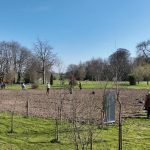Living, as we do, in an age of mass communication, instant connectivity, social media outlets, virtual meetings and remote learning, it can be difficult to know how we, as Christians, should behave towards each other. We are all charged to love one another and are happy to do so but, when nowadays we often have little personal interaction with others, how?
However, we can take heart from today’s reading from Luke’s gospel, written almost two thousand years ago and containing, as it does, a set of instructions (a users’ manual if you will) to guide and direct us. In a remarkably prescient observation, Luke tells us that Jesus said that we are like lambs amongst wolves and, as anyone who has been attacked by trolls and keyboard warriors on the internet will attest, this is as true today as it was then.
So, how does a lamb survive amongst wolves? Luke provides us with (at least some of) the answers albeit in language that may seem a little strange to us today: ‘no money bag, no sack, no sandals.’ Of course, what this really suggests to us is that we try to live our lives as simply and plainly as possible, to focus on what is really important and to not get too hung up on material things in the hope that they will be inspired to do the same.
Further, ‘the lamb’ has to develop a thick skin so that if his message of love and peace is rejected by ‘the wolves’, then he just walks away and, metaphorically at least, shakes their dust from his feet. Sound advice this, as a lamb will never come out the winner in a fight with a wolf and, of course, there are none so blind as those who will not see. In some respects, Luke’s instructions seem stern, but they certainly set out for us an approach that is principled and honourable. For, if the harvest referred to in today’s gospel was abundant two thousand years ago, then it is hardly less so in our time. We can all help to reap it by the example of our lives, treating strangers with civility and respect and being loving, kind and patient to our families and friends.








